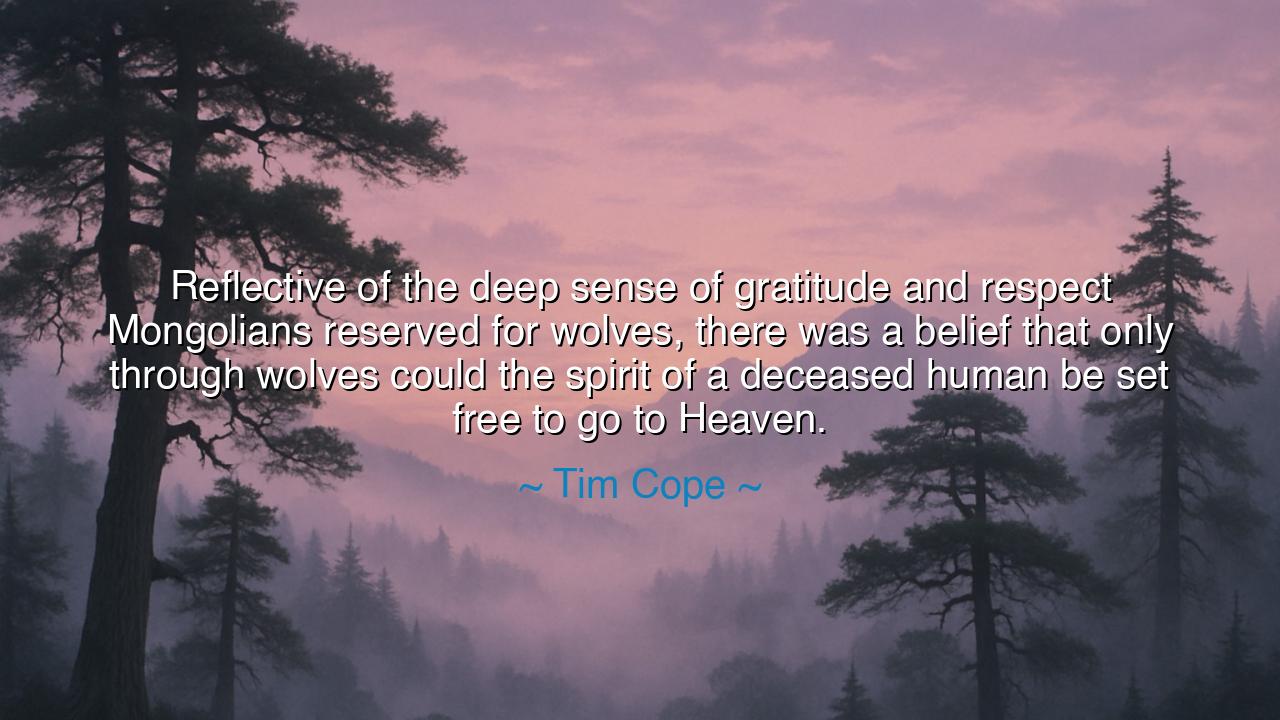
Reflective of the deep sense of gratitude and respect Mongolians
Reflective of the deep sense of gratitude and respect Mongolians reserved for wolves, there was a belief that only through wolves could the spirit of a deceased human be set free to go to Heaven.






"Reflective of the deep sense of gratitude and respect Mongolians reserved for wolves, there was a belief that only through wolves could the spirit of a deceased human be set free to go to Heaven." These words from Tim Cope reveal a profound connection between the Mongolian people and the wolf, a bond that reflects the deepest reverence for nature and the spiritual world. The wolf, an animal both feared and revered, was seen not just as a beast of the wild, but as a sacred messenger between the earthly realm and the heavenly domain. This belief speaks to the sacred place animals occupy in the cosmologies of ancient cultures—where they are not just creatures, but mediators of spiritual power and transcendence.
In the ancient world, animals were often seen as spiritual guides, carrying with them the wisdom and power of the gods. The Greeks honored the dolphin as a symbol of Apollo, the god of music and prophecy, believing that dolphins carried messages from the divine. Similarly, the Romans saw the eagle as the embodiment of Zeus, a symbol of majesty, strength, and connection between earth and sky. To the Mongols, the wolf was no less sacred, embodying both the wildness and freedom of the steppe and the spiritual connection to the afterlife. Just as the Greeks and Romans looked to animals for divine favor and wisdom, the Mongols believed that it was through the wolf that the spirit of a deceased human could transcend earthly bounds and ascend to the heavens.
The wolf's role in Mongolian culture can be traced back to Genghis Khan, one of the most legendary figures in human history. Genghis Khan’s lineage was said to be divinely inspired, with the wolf playing a central role in the story of his birth and descent. According to Mongolian legend, Genghis Khan’s mother was visited by a blue wolf and a fawn before giving birth to the great conqueror. The wolf, as the ancestor spirit, symbolizes strength, resilience, and a connection to the divine, offering a powerful reminder of how animals were intertwined with the spiritual and royal lineages of the time. The Mongols did not just view wolves as predators, but as sacred creatures, guiding them through the great journey of life, death, and beyond.
In the Mongolian spiritual belief, the wolf served as a vehicle of transition, helping souls pass from the realm of the living to the world of the gods. This belief reflects a broader theme in many cultures: that animals are more than mere creatures of instinct—they are integral to the cosmic balance. In ancient Egypt, for example, Anubis, the god of the afterlife, was depicted with the head of a jackal, guiding souls to the afterlife with compassion and wisdom. The connection between animals and the spirit world speaks to the ancient recognition of the sacredness of all life, and the understanding that the boundaries between the earthly and the divine are not as distinct as we often imagine.
The deeper lesson in Tim Cope’s words, and in the beliefs of the Mongols, is that the natural world is not something to be conquered or dominated, but something to be revered and understood. The wolf, as a symbol of strength and freedom, teaches the importance of balance between the material and the spiritual. To the Mongols, the wolf was not simply an animal in the wild, but a sacred being whose spirit could guide the dead to the afterlife, showing how intertwined the physical world and the spiritual realm truly are. Respecting nature and understanding our place within it is key to achieving harmony and balance in life and death.
In our own lives, we must take a moment to consider the profound connection we share with the natural world. The Mongolian respect for the wolf urges us to see the creatures around us not just as resources or obstacles, but as beings with whom we share this planet. Each animal, whether it is a bird, a wolf, or a dolphin, carries with it the spirit of the earth and is integral to the balance of the world. Just as the Mongols saw the wolf as a bridge to the afterlife, we too can learn from their reverence and respect for all forms of life. Let us acknowledge that we are not separate from the earth, but connected to it in profound, spiritual ways.
The lesson here is to embrace the wisdom of the ancient cultures that understood the interconnectedness of all life. Just as the Mongols respected the wolf as a guide to the afterlife, we must respect and understand the role of all creatures in the great web of existence. Let us learn from the ancient understanding that life and death, the earth and the spirit world, are not separate entities but parts of a continuous cycle. May we treat the world around us with the respect it deserves, acknowledging the sacredness of life in all its forms and learning to live in harmony with the earth that sustains us.






AAdministratorAdministrator
Welcome, honored guests. Please leave a comment, we will respond soon